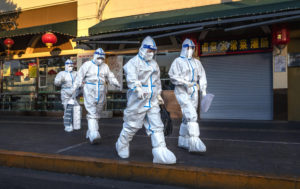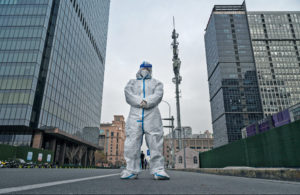As Chinese New Year approaches, there is apprehension in a part of China often overlooked by overseas news reports: the countryside. China’s now-abandoned Zero-Covid policy was always more focused on urban areas; locking down apartment blocks in Shanghai or smartphone factories in Beijing was always more practical than doing the same in China’s extensive rural hinterland. But now that China’s biggest annual holiday is just weeks away, with tens of millions of people set to travel across the country, the latest Covid wave is sure to follow in every high-speed train or crowded bus.
A preview of the tension this will inevitably arouse was revealed towards the end of last year, when a film about rural China became a surprise box office hit in the country — before being pulled. Return to Dust, directed by Li Ruijun, portrays a rural couple (played by renowned actress Hai Qin and farmer-turned-amateur-actor Wu Renlin) who are pushed into an arranged marriage. Over time, they develop a quiet, understated love while dealing with countryside poverty. The luminous and deeply moving story ends in a muted tragedy.
The film received international accolades, but in September, it was abruptly removed from Chinese streaming services and discussion of it was censored on social media. No official reason was given, though there was speculation that the film’s bleak and unglamorous view of rural society was unwelcome just before the 20th Party Congress, when Xi Jinping would seek (and gain) an unprecedented third term in power.
Before it was banned outright, there was a brief moment when the distributors tacked a more upbeat ending onto the end of the film. There is a long tradition of this tactic. Back in 1950, one of the first films made under the new Maoist government was This Life of Mine, directed by the brilliant Shi Hui, and based on a story by the novelist Lao She. The story is bleak: across the first decades of the 20th century, a policeman falls lower and lower in social status as his economic situation worsens. Eventually he falls down dead. Although the film was an indictment of the old society that had been ended by the 1949 revolution, the censors clearly thought that such a downbeat ending was too depressing for audiences in a glorious new China. So they added some gratuitous but rousing footage at the end of People’s Liberation Army soldiers storming towards victory.
Yet the desire to change narratives in films about contemporary issues is a thread that runs through the Chinese Communist Party’s political tactics. Gao Xiang, the historian who has just become president of the Chinese Academy of Social Sciences (CASS), recently reiterated the importance of treating history as a “Marxist” subject; in other words, one that has a definite grand narrative, based on “objective” factors. The rise to power of the CCP is the grandest possible such narrative, and the transformation of Chinese society the inevitable consequence of its rise.
That certainty sits in stark contrast with the story that the CCP tells about the pre-1949 world. This Life of Mine made the cut in the Fifties because it was primarily about a supposedly feudal society that had now been eliminated, one where individuals had little control over their own fates. There are scenes in Return to Dust that could easily fit into the 1950 film — for instance, a moment when the protagonist is pushed into donating blood to save the life of a local landlord, in the hope that he’ll be given some leeway on his rent (he isn’t).
As metaphors go, this one isn’t subtle. Yet this isn’t the bad “old society” but the 2020s, a decade after the initiation of Xi’s “new era”. In this context, the implication that ordinary Chinese citizens, particularly the peasant farmers who were at the heart of the revolution, have turned into passive victims of fate, is an indictment of the CCP. After all, in the Forties, the revolution was made in the countryside, with “land reform” used euphemistically to describe the violent seizure of land, and public humiliation and lynching of thousands of landlords by poorer peasants, all organised by the Party in campaigns to “speak bitterness”. Today, that same party does not welcome hints that seven decades of reform have not eliminated that bitterness.
Here, the countryside is a particularly sensitive subject. China’s rural areas did suffer during Covid, but less from the effects of the disease than from its knock-on effects. Online teaching, relatively easy to arrange in well-connected cities, proved much harder to arrange outside of urban areas. The capacity crisis was further exacerbated by longer-standing problems that have dogged China’s attempts to improve rural education in the past few decades. China offers free primary education, up to grade 9 (aged 14-15), but textbooks and tuition fees then fall on family shoulders during high school. Many parents move to the city to earn enough money to pay for their families. However, the internal passport (hukou) system means that if their children come with them, they can’t register at local schools (although there are charities that do provide some schooling for migrant labourers’ children in some cities). And if their children stay at home, they do so in the care of grandparents or state boarding schools, which are a long way from the elite high schools in Shanghai that nurture youthful genius in maths and music.
Local governments are expected to foot the bills, but they are almost all strapped for cash and loaded with debt. (One of reasons for the Zero-Covid protests was that the central government created the legislation but local governments were expected to pay for its implementation, including expensive PCR tests). Then, even if you have funding, it is very hard to get good teachers. Few urban graduates want to spend years in what they consider backward parts of the country on miserable salaries.
Back in 1987, Chen Kaige directed King of the Children, which dealt with the dilemmas faced by an idealistic teacher going to an impoverished area of southwest China. Today, however, there are too few real-life equivalents to his fictional hero, meaning that some 60% of rural children drop out of high school. This doesn’t bode well for a country whose shrinking population means that it will have to develop a highly educated workforce serving a high value economy. There are more signs of this change in southern China, where the financial power of Hong Kong and the emergence of the Shenzhen tech hub have created a much stronger set of economic drivers. But in the impoverished north-west, the need for levelling-up makes Britain’s gap seem tiny.
In one scene in Return to Dust, we are shown a “solution” to the rural dilemma which is becoming all too common. The couple’s land is purchased at a low price, under pressure from local elites, and they are scheduled to move into one of the new, underpopulated tower blocks that mark so many of the instant cities thrown up during China’s property boom (now in danger of becoming a property crash). “Where will my donkey go?” asks the protagonist plaintively. It’s not just donkeys who are cut out of the picture in the new cities, but also the rural way of life as a whole. Simply creating instant urbanites, without lives and structures to replace what they have lost, is a huge challenge. No wonder that nearly 100 million Chinese suffer from mental health or anxiety disorders.
Some might suggest that Return to Dust, though beautifully shot and movingly performed, is slow and doesn’t have a definitive conclusion. But that, in a sense, is the point. There are plenty of narratives created by China, and by others about it, that have conclusions either transformative or apocalyptic: from the power of its economy to its threats over Taiwan. Yet for many Chinese, it is the slow but very real crises in the countryside that are likely to create dilemmas on a day-to-day basis. These can be the specifics of poor education or rising Covid rates. But they might also be the anomie that comes from a growing realisation that China is a fast-modernising society which has yet to develop a convincing story about how its peasant farmers, for thousands of years the backbone of society, are going to fit into its national story.
***
Return to Dust is available to stream online (outside China).
Disclaimer
Some of the posts we share are controversial and we do not necessarily agree with them in the whole extend. Sometimes we agree with the content or part of it but we do not agree with the narration or language. Nevertheless we find them somehow interesting, valuable and/or informative or we share them, because we strongly believe in freedom of speech, free press and journalism. We strongly encourage you to have a critical approach to all the content, do your own research and analysis to build your own opinion.
We would be glad to have your feedback.
Source: UnHerd Read the original article here: https://unherd.com/




